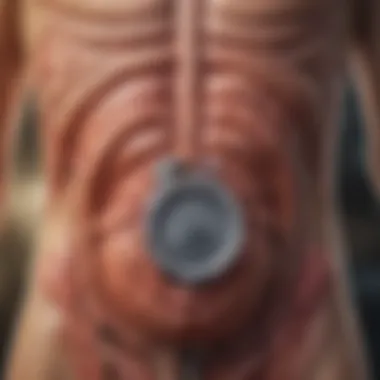Understanding the Causes of Stinky Farts


Intro
The scent of flatulence can invoke a range of reactions, yet understanding the reasons behind these odors provides valuable insight into our digestive health. Foul-smelling gas is often a source of embarrassment, but its causes stem from complex physiological processes involving diet, gut flora, and even health conditions. This article aims to connect these elements, offering a thorough analysis of what contributes to stinky farts.
Health Benefits
Physical Health Benefits
An in-depth examination of foul-smelling flatulence reveals more than just a social faux pas. When the body produces particularly odorous gas, it may signal underlying issues related to digestion and nutrient absorption. Moreover, understanding these causes fosters awareness of dietary choices and their influence on gastrointestinal health. Addressing these factors could lead to the following physical health benefits:
- Improved Digestion: Knowledge of individual triggers can lead to dietary adjustments that minimize gas production and discomfort.
- Nutrient Absorption: Identifying intolerances or sensitivities to certain foods can enhance the body's ability to absorb vital nutrients.
- Gut Flora Balance: A focus on gut health helps to maintain a diverse microbiome, essential for overall well-being.
Mental Health Benefits
The intricate link between gut health and mental well-being is gaining recognition. Discomfort and embarrassment caused by persistent flatulence can impact self-esteem and social interactions. By understanding the root causes, individuals may experience:
- Reduced Anxiety: Improved digestive health leads to less worry about bodily functions during social situations.
- Enhanced Confidence: A sense of control over one's body can contribute positively to social engagement.
"The gut-brain connection highlights the need for holistic approaches to health, where digestive wellness may ultimately impact mental clarity and emotional stability."
Practical Tips
Healthy Eating Guidelines
Identifying and modifying dietary sources of gas can significantly reduce unpleasant odors. Here are some key guidelines:
- Limit High-Sulfur Foods: Foods like garlic, onions, and cruciferous vegetables can contribute to odor. Moderation may help.
- Monitor Lactose Intake: Many struggle with lactose tolerance, leading to gas. Consider lactose-free alternatives.
- Incorporate Probiotics: Foods such as yogurt and fermented items help promote a healthy balance of gut bacteria.
- Stay Hydrated: Adequate fluid intake aids digestion and supports a healthy gut.
Effective Workout Routines
Exercise promotes gut health by improving transit time through the intestines and supporting the microbiome. Consider these practices:
- Regular Aerobic Exercise: Activities like walking, running, or swimming can enhance digestive function.
- Core Strengthening: Engaging in exercises that strengthen abdominal muscles may aid overall gastrointestinal health.
- Yoga: Certain poses can aid digestion and help release trapped gas.
Overall, by understanding the causes of stinky farts, individuals can navigate dietary choices and health practices that enhance their well-being. The interplay of diet, lifestyle, and health status can lead to improvements in both physical and mental health, making awareness essential for everyone seeking to optimize their digestive health.
Prolusion to Flatulence
Flatulence is a natural biological process that occurs in many organisms, including humans. It is the result of gas forming in the intestines and eventually being expelled through the rectum. Understanding flatulence is essential as it provides insights into digestive health, dietary choices, and overall well-being. This section sets the stage for a deeper exploration of the causes and considerations surrounding stinky farts.
The significance of investigating flatulence lies in its ability to reveal underlying health issues. For example, persistent or foul-smelling gas may indicate a digestive disorder or an intolerance to certain foods. Moreover, recognizing how lifestyle choices and dietary habits influence gas production can lead to substantial benefits. By adjusting what one eats and how one approaches digestion, individuals can improve their quality of life.
Defining Flatulence
Flatulence, often colloquially referred to as gas or farting, involves the expulsion of gas from the digestive tract. In technical terms, this gas comprises a mix of nitrogen, oxygen, carbon dioxide, hydrogen, and sometimes methane. The formation of gas is primarily a byproduct of digestion. When food is broken down in the intestines, it interacts with the gut flora, leading to the production of gas. This process is shaped by various factors, including diet, gut health, and individual biology.
Most importantly, not all flatulence is created equal. While some gas is neutral or even odorless, others can carry a strong, unpleasant smell. This difference is often attributed to the types of foods consumed and their fermentation properties. Recognizing what constitutes normal flatulence versus concerning indicators is crucial for anyone focusing on digestive health.
The Digestive Process and Gas Production
The digestive process is intricate and involves multiple organs working synergistically. When food is consumed, it travels through the esophagus into the stomach, where it is mixed with digestive juices. Afterward, it moves into the small intestine for further breakdown with the help of enzymes.
During this phase, certain foods can linger longer than expected, especially those high in fiber or complex carbohydrates. This delayed digestion allows bacteria in the intestines more time to ferment these substances, resulting in gas production. Facultative anaerobes and other microorganisms play a major role here, breaking down indigestible materials to generate gas as a byproduct.
The specific types of gas produced can vary widely based on dietary choices. Fermentation of carbohydrate-heavy foods often leads to the generation of hydrogen, carbon dioxide, and methane. Conversely, foods rich in sulfur may produce foul-smelling hydrogen sulfide, contributing to the unpleasant odor associated with certain types of flatulence. By understanding this digestive process, one can better manage and perhaps mitigate instances of foul-smelling gas.
The Composition of Gas


Understanding the composition of intestinal gas is crucial in deciphering the reasons behind foul-smelling flatulence. The gases produced during digestion not only reflect the health of the digestive system but also give insight into dietary habits. By exploring the different components of gut gas, one can identify specific factors contributing to odoriferous emissions. This section will examine the types of gases present in the gut, and their roles, which aids in promoting better digestive health.
Understanding Gases in the Gut
The human gut produces a variety of gases as a byproduct of digestion. These gases are generated through the breakdown of food by bacteria, a process known as fermentation. Common gases found include nitrogen, oxygen, carbon dioxide, hydrogen, and methane. Each of these gases contributes differently to the overall smell of flatulence.
Nitrogen and oxygen generally come from swallowed air. In contrast, carbon dioxide is mainly produced by the metabolism of carbohydrates. Hydrogen and methane, on the other hand, arise from the fermentation of undigested food substances. The balance between these gases can influence whether a person’s gas is malodorous or not.
Research suggests that individual gut flora, or the collection of microorganisms in the digestive tract, plays a significant role in gas composition. The types of bacteria present affect what gases are produced and how they interact with various foods. For instance, certain types of bacteria may produce worse-smelling gases when they ferment specific undigested carbohydrates.
Odorous vs. Non-Odorous Gases
Not all gases produced in the digestive system carry an odor. The distinction between odorous and non-odorous gases is essential for understanding why some flatulence is particularly unpleasant.
Odorous gases primarily include:
- Hydrogen sulfide
- Ammonia
- Short-chain fatty acids
These gases can be released when foods high in certain compounds, like sulfur, are digested. Foods such as eggs, meat, and cruciferous vegetables are known to increase the likelihood of producing these foul-smelling compounds.
In contrast, non-odorous gases comprise:
- Nitrogen
- Oxygen
- Carbon dioxide
- Hydrogen
- Methane
These gases are typically harmless and contribute to the bulk of flatulence. Non-odorous gases can occur due to normal digestive processes and do not usually signal a problem in digestion.
It is important to appreciate these differences, as it provides insight into how dietary alterations can impact the odors associated with flatulence. Reducing intake of foods that promote more odorous gas production can help in managing discomfort and improving overall social situations.
Understanding the balance and composition of gases in the gut helps in making informed choices about diet and digestion.
Dietary Factors Contributing to Odor
Understanding dietary factors contributing to foul-smelling flatulence is crucial for recognizing how certain foods impact our digestive system. Our diet not only influences the smell of gas produced but also affects our overall gut health. Identifying culprits that lead to odoriferous gas can empower individuals to make informed choices about their nutritional intake. This section breaks down specific foods that are known to encourage the production of odorous gas.
High Sulfur Foods
High sulfur foods are widely recognized for their potential to produce particularly stinky farts. Foods such as garlic, onions, and cruciferous vegetables like broccoli and cabbage have significant sulfur content. When these foods are digested, sulfur-containing compounds release gases like hydrogen sulfide, which has a notorious rotten egg smell. While these foods hold various health benefits, it is essential to consume them wisely. Not everyone will react the same way, and moderation may help mitigate odor.
Fermentable Carbohydrates
Fermentable carbohydrates are another class of dietary components closely linked to flatulence. Foods rich in fermentable fibers, such as beans, lentils, and whole grains, can undergo fermentation in the gut. This process can produce gas as a byproduct, leading to potential discomfort and odor. While these foods are important for their fiber content and overall health benefits, people with sensitive digestive systems may experience enhanced symptoms when consuming large amounts.
Dairy Products and Lactose Intolerance
Dairy products can also contribute to unpleasant flatulence, particularly in individuals with lactose intolerance. Lactose is a sugar found in milk and other dairy items. Individuals lacking the enzyme lactase may find it difficult to digest lactose, resulting in gas production when it ferments in the intestine. This process can lead to very foul-smelling farts. Substituting with lactose-free products or plant-based alternatives can help those intolerant to dairy to continue enjoying the nutritional benefits without the odor.
Artificial Sweeteners and Sugars
Artificial sweeteners such as sorbitol and mannitol can significantly affect flatulence. These sweeteners are often poorly absorbed in the digestive tract, leading to fermentation and gas production. Many sugar-free products contain these sweeteners, which can result in increased gas formation and associated odor. Reading labels critically can assist individuals in recognizing which products may lead to discomfort and unpleasant gas emissions.
"Maintaining awareness of dietary choices is instrumental in managing flatulence and improving digestive health."
Health Conditions Associated with Stinky Farts
Understanding the various health conditions linked to foul-smelling flatulence is essential for a thorough analysis of digestive health. Flatulence can sometimes indicate underlying issues that extend beyond diet and lifestyle. By recognizing the association between certain conditions and odoriferous gas, individuals can take informed steps towards improving their overall well-being and digestive function.
Being aware of specific health conditions is crucial, as they may require professional medical advice or tailored interventions. This knowledge empowers individuals to make dietary adjustments or consult healthcare providers to address these issues effectively.
Irritable Bowel Syndrome (IBS)


Irritable Bowel Syndrome, or IBS, is a common gastrointestinal disorder characterized by symptoms such as abdominal pain, bloating, and altered bowel habits. Many individuals with IBS experience excessive gas and flatulence, often accompanied by stronger odors. The exact cause of IBS remains unclear, but it is believed to involve a combination of factors, including gut motility issues, gut-brain interactions, and microbial imbalances.
Managing IBS often requires a comprehensive approach, including dietary modifications. Patients may benefit from identifying personal triggers, which could include foods rich in fermentable carbohydrates. By keeping a food diary, individuals can track which foods exacerbate their symptoms. This awareness allows for a more targeted approach to dietary choices, ultimately assisting in minimizing gas production and enhancing comfort.
Celiac Disease
Celiac Disease is an autoimmune condition wherein the ingestion of gluten leads to damage in the small intestine. This impairment can disrupt nutrient absorption and lead to malabsorption-related issues such as gas and bloating. Individuals with celiac disease may also report stinky farts as a result of undigested nutrients in the intestine, which ferment and produce gas.
A strict, lifelong adherence to a gluten-free diet is necessary for managing celiac disease. This dietary change can reduce gastrointestinal distress and the prevalence of flatulence. However, transition can be challenging, as gluten is present in numerous foods. Guidance from healthcare providers can help celiac patients better navigate their dietary needs and minimize digestive symptoms.
Gastrointestinal Infections
Gastrointestinal infections, whether caused by bacteria, viruses, or parasites, can significantly impact gut health. These infections often lead to changes in bowel habits, abdominal pain, and increased flatulence. Frequently, the gas produced during such infections carries a more pungent aroma due to the resulting alterations in gut flora and increased fermentation processes.
Recovery from gastrointestinal infections typically involves hydration and, in some cases, antibiotics or antiviral medications. It is essential to follow a healthcare provider's advice to ensure proper treatment and avoid complications. Additionally, individuals may need to be cautious when reintroducing foods to their diet post-infection to avoid further digestive upset.
Bacterial Overgrowth
Small Intestinal Bacterial Overgrowth (SIBO) occurs when there is an excessive growth of bacteria in the small intestine. This condition can disrupt normal digestion and absorption, leading to symptoms such as bloating, diarrhea, and notably, foul-smelling gas. The overgrowth can interfere with nutrient absorption, causing malnutrition and increased fermentation of undigested food.
Diagnosing SIBO typically involves breath tests that measure hydrogen or methane levels. Treatment often includes antibiotics, although dietary modifications may also play a role in management. Low FODMAP diets can sometimes alleviate symptoms, as these diets limit fermentable carbohydrates that can exacerbate gas production.
Proper understanding of these health conditions can guide individuals in managing their symptoms more effectively.
By being aware of potential underlying issues, individuals can seek professional advice when necessary, leading to a more nuanced approach to digestive health.
The Role of Gut Flora
Gut flora, also known as gut microbiota, plays a significant role in the digestive process and can greatly influence the odor of flatulence. The human gut is home to trillions of microorganisms, which include bacteria, fungi, viruses, and archaea. These microorganisms are not merely passive inhabitants; they actively participate in digestion, metabolism, and even immune function. The balance of these gut bacteria is essential for maintaining overall health and is particularly relevant in understanding causes of stinky farts.
The health of gut flora can affect the production and composition of intestinal gases. For example, a diverse microbiome can help break down certain food compounds efficiently, resulting in less production of odorous gases such as hydrogen sulfide. Conversely, an imbalance in gut flora, known as dysbiosis, can lead to increased gas production and unpleasant odors.
In this light, understanding how gut flora functions is crucial for individuals experiencing frequent odoriferous flatulence. It can inform dietary choices and underscore the importance of maintaining a healthy microbiome for optimal digestive health.
Understanding Microbial Diversity
Microbial diversity within the gut is indicative of overall gut health. A diverse gut microbiome can lead to more efficient digestion and better metabolic processes. When different types of bacteria coexist, they can perform a wider range of functions. This includes breaking down complex carbohydrates, producing essential vitamins, and even regulating the immune system.
Studies show that individuals with a richer microbial diversity tend to experience fewer digestive issues. A diet rich in fiber, fruits, and vegetables can nourish beneficial bacteria, promoting this diversity. In contrast, a diet high in processed foods tends to favor a limited array of microbes, which may increase the likelihood of producing foul-smelling gas.
Here are some benefits of maintaining microbial diversity:
- Improved digestion and nutrient absorption
- Enhanced immune response
- Reduced incidence of gastrointestinal disorders
- Lesser production of gas and odorous flatulence
To maximize gut flora diversity, individuals should consider incorporating a variety of foods into their diet. Probiotic-rich foods and prebiotics are instrumental for cultivating a diverse microbial environment.
Impact of Probiotics
Probiotics refer to live microorganisms that, when consumed in adequate amounts, confer health benefits to the host. These beneficial bacteria play a pivotal role in shaping the gut microbiome. Research suggests that regular intake of probiotics can help restore the balance of gut flora, especially after disturbances such as antibiotic use or gastrointestinal infections.
The impact of probiotics on reducing the odor of flatulence is notable. They can improve digestion and help in breaking down indigestible carbohydrates that commonly lead to gas production. Some studies even suggest that specific strains of probiotics can inhibit the growth of gas-producing bacteria, thereby reducing the volume and odor of flatulence.
For optimal results, individuals may consider the following sources of probiotics:
- Yogurt with live cultures
- Kefir
- Sauerkraut
- Kimchi
- Miso
Psychological and Stress-Related Factors


Understanding the psychological and stress-related factors that influence flatulence is essential for a complete examination of this topic. The connection between mental health and digestive function has gained attention in recent years, leading to greater awareness of how one's emotional and psychological states can impact bodily functions, including gas production. Stress, anxiety, and depression can significantly alter the way food is digested and how the body reacts to it, contributing to unpleasant flatulence.
Stress and Digestive Health
Stress plays a pervasive role in our overall health and can be particularly detrimental to the digestive system. When an individual experiences stress, the body's fight-or-flight response is activated. This can result in several physiological changes that may affect digestion:
- Altered gut motility: Under stress, the speed at which food travels through the digestive tract can change. This disruption can lead to either constipation or diarrhea, both of which can contribute to gas accumulation.
- Increased gut permeability: Stress may also lead to a phenomenon known as leaky gut syndrome. When the gut becomes more permeable, it allows undigested food particles and bacteria to enter the bloodstream, potentially causing an imbalance in gut flora.
- Altered food choices: Stress can lead to emotional eating, where individuals reach for high-sugar or high-fat comfort foods. These foods can be harder to digest and may produce more gas during the digestive process.
Due to these factors, managing stress effectively is crucial for maintaining digestive health and minimizing odoriferous gas production.
Psychosomatic Influences
Psychosomatic influences refer to the way psychological factors can manifest physically. A common example involves the mind-body connection, where emotional states can lead to digestive symptoms, including flatulence. Some key aspects of this relationship include:
- Anxiety and gas: Anxiety can heighten awareness of bodily sensations, making individuals more attuned to their digestive processes. This can lead to increased concern about flatulence, which may intensify the experience.
- Mindful eating: Conversely, practicing mindfulness can improve one’s relationship with food. By focusing on the eating experience, individuals may better regulate their digestive processes, leading to less gas production.
- Stress management techniques: Techniques such as meditation, yoga, and deep-breathing exercises can help reduce overall stress levels. By integrating these practices, individuals often notice an improvement in both psychological and digestive health.
An understanding of psychosomatic influences can aid individuals in recognizing how their mental state relates to physical symptoms, including gas production.
Implementing strategies to manage stress and promote mental wellness is crucial for improving digestive health. Engaging in healthy lifestyle choices, including proper diet, physical activity, and stress reduction techniques, can foster a more balanced and healthier digestive system.
Lifestyle Factors and Flatulence
Understanding the connection between lifestyle factors and flatulence is key to addressing unpleasant gas issues. Lifestyle choices can significantly impact digestive health, influencing the frequency and odor of flatulence. Elements such as eating habits and physical activity play crucial roles in how our bodies process food and manage gas production.
Eating Habits
The way we consume food greatly affects gas production in the digestive system. Eating too quickly can lead to swallowing air, which contributes to excess gas. This typically results in higher rates of flatulence. To mitigate this, individuals should focus on eating slowly and mindfully. Chewing food thoroughly ensures proper digestion and lessens the likelihood of foul-smelling gas.
Additionally, portion sizes matter. Large meals can overwhelm the digestive system, leading to fermentation of undigested food in the intestines. Here are several points to consider regarding eating habits:
- Mindfulness: Paying attention to eating without distractions helps regulate intake.
- Small Portions: Consuming smaller meals more frequently can aid digestion.
- Food Combinations: Certain food pairings may increase gas production. For example, combining high-fiber foods with proteins can lead to greater gas formation.
Incorporating a balanced diet rich in whole foods while avoiding overly processed items is fundamental. Many people find that specific foods trigger their flatulence. Keeping a food diary may help identify these triggers.
Physical Activity and Digestion
Physical activity also significantly influences digestion and, consequently, flatulence. Regular movement aids the digestive system by promoting healthy gut motility. Engaging in light exercises, such as walking or stretching, after meals aids in breaking down food efficiently.
Sedentary lifestyles hinder digestion. Inactivity can lead to sluggish digestion, causing food to sit longer in the intestines, where it may ferment and produce more gas. Here are elements to take into account regarding exercise and digestion:
- Consistency Matters: Regular exercise can improve overall gut health and reduce gas issues.
- Type of Activity: Activities like yoga may help alleviate some digestive discomfort and gas.
- Listen to Your Body: If a particular form of exercise seems to aggravate digestive issues, adjusting intensity might be necessary.
"Mindful eating and regular exercise can lead to significant improvements in your digestive health and can help manage flatulence."
Adopting these lifestyle changes might not yield instant results, but over time, they can have a lasting positive impact on overall gut health.
Culmination and Recommendations
Understanding the causes of stinky farts is crucial not only for personal health but also for social and emotional well-being. Flatulence, though a natural process, can become a source of embarrassment if it is excessively smelly. This article has provided insights into various dietary factors, health conditions, and lifestyle choices that contribute to the production of foul-smelling gas. By recognizing these elements, individuals can take actionable steps to mitigate the issue.
Understanding Your Body
It is essential to become attuned to your body's signals. Flatulence can indicate a variety of underlying issues. For instance, some people may experience increased odor after consuming high-sulfur foods such as broccoli or garlic. Others may find their symptoms flare up with the consumption of certain dairy products like cheese and milk, especially if they are lactose intolerant. Observing and noting how your body reacts to different foods can provide valuable insights.
To improve digestive health, individuals can consider keeping a food diary. This record helps in identifying specific triggers that lead to unpleasant gas. Simple practices such as eating slowly, avoiding carbonated beverages, and maintaining a balanced diet high in fiber might also aid in reducing gas production.
Adopting mindfulness techniques while eating, alongside regular physical activity, can further enhance digestion and gut health.
Consultation with Healthcare Providers
Engaging with healthcare professionals is another critical step in managing stinky farts. If dietary changes do not lead to an improvement, consulting a doctor or a nutritionist is advisable. Health conditions such as Irritable Bowel Syndrome, Celiac Disease, or bacterial overgrowth might necessitate professional evaluation.
Healthcare providers can offer tailored guidance, potentially recommending specific tests to rule out underlying conditions. They may also suggest dietary modifications or probiotics to recalibrate gut flora, which can play a significant role in digestive health.
"Regular consultation with a healthcare provider fosters a better understanding of individual health and encourages proactive management of digestive issues."















